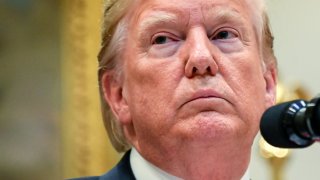
- A judge in Georgia approved the creation of a special grand jury to assist in collecting testimony for a criminal investigation of former President Donald Trump for interference in the 2020 election.
- Trump lost the 2020 presidential election to President Joe Biden in Georgia and a number of other key swing states, ensuring Biden won the Electoral College vote.
- Days before Biden's win was certified by Congress, Trump pressured Georgia's secretary of state to "find" him enough votes to reverse Biden's win in that state.
- On January 6, 2021, a mob of Trump supporters invaded the U.S. Capitol, fuelled by his false claims of election fraud.
A judge in Georgia on Monday approved the creation of a special grand jury to assist in collecting testimony as part of a criminal investigation into efforts by former President Donald Trump to alter the outcome of that state's 2020 election.
The approval came at the request of the Atlanta District Attorney Fani Willis, who on Thursday said a significant number of witnesses were refusing to cooperate with her probe of Trump unless they were subject to a grand jury subpoena.
The special grand jury in the Trump probe will begin May 2 and will work for no longer than 12 months, according to an order issued by Fulton County Chief Judge Christopher Brasher, who approved the panel after a majority of county judges endorsed the request.
Under Georgia law, special grand juries, which are rarely created, cannot indict defendants on criminal charges. However, they can issue subpoenas for testimony, documents and other evidence, which a prosecutor then can use as the basis for criminal charges. Special grand juries also can make recommendations on prosecutions of individuals.
Trump lost the 2020 presidential election to President Joe Biden in Georgia and a number of other key swing states, ensuring Biden won the Electoral College vote nationally.
Money Report
Four days before Biden's win was certified by Congress, Trump in a Jan. 2, 2021, phone call pressured Georgia's Secretary of State Brad Raffensberger to "find" him enough votes to reverse Biden's win in that state.
Get a weekly recap of the latest San Francisco Bay Area housing news. >Sign up for NBC Bay Area’s Housing Deconstructed newsletter.
"All I want to do is this: I just want to find 11,780 votes," Trump told Raffensperger that day.
In the same call, Trump also made what Georgia's voting system implementation manager days later called a series of "provably false" claims about purported election irregularities.
Raffensberger, according to the DA Willis, who is "an essential witness to the investigation, has indicated that he will not participate in an interview or otherwise offer evidence until he is presented with a subpoena by my office."
Trump's efforts with Georgia officials were part of a coordinated campaign to undo Biden's victory in several swing states through court actions, political pressure and other means.
The effort failed hours after a horde of Trump supporters invaded the U.S. Capitol complex on Jan. 6, 2021, four days after Trump's call to Raffensberger. Right before the invasion, Trump had urged attendees at a rally outside the White House to fight against the confirmation of Biden's win by a joint session of Congress, and called on his own vice president, Mike Pence, to void the Democrat's victory by rejecting slates of electors from several swing states.
Pence refused to do Trump's bidding, and Biden was confirmed as the winner of the Electoral College vote after the mob left the Capitol.
The grand jury that will investigate the Trump case will be supervised by Fulton County Judge Robert McBurney, according to Monday's order.
A spokeswoman for Trump did not immediately respond to CNBC's request for comment on the special grand jury decision.
But on Friday, Trump in a statement on Willis' request for a special grand jury repeated his false claims of widespread ballot fraud in the state, which he argues led to his defeat there, and elsewhere.
"So let me get this straight, I am being investigated in Georgia for asking an attorney general with many lawyers and others knowingly on the phone to look for corruption, which definitely took place in the Georgia presidential election — but the people who committed the crime are in no way, shape or form under investigation and are instead being protected?" Trump said.
Also Friday, a Texas resident named Chad Stark was arrested by federal authorities for allegedly posting a threat to kill a Georgia election official and other officials just days after Trump's call to Raffensberger.
Stark is accused in an indictment of posting a message on Craigslist on Jan. 5, 2021, with the subject: "Georgia Patriots it's time to kill [Official A] the Chinese agent - $10,000."
That official was identified as a state election worker, and the message was written on the same day as the runoff elections for Georgia's two U.S. Senate seats that were won by Democratic challengers, Raphael Warnock and Jon Ossoff.
- Additional reporting by CNBC's Kevin Breuninger






